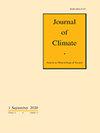北美二月极端天气的归因:基于预测的故事情节研究
IF 4
2区 地球科学
Q1 METEOROLOGY & ATMOSPHERIC SCIENCES
引用次数: 0
摘要
摘要 随着气候变化导致前所未有的事件对人口造成严重损害,极端事件归因的重要性也随之上升。2019 年 2 月,行星波沿美加边境移动,同时导致低谷和异常寒冷事件,以及阿拉斯加和加拿大北部的脊状异常温暖事件。此外,低纬度地区干燥稳定的反气旋环流也在墨西哥和美国佛罗里达州诱发了暖极端事件。大多数归因研究都是比较自然或实际强迫条件下的气候模式模拟,并从气候学角度进行概率评估。然而,在本研究中,我们使用了运行预报模式的多个集合,有望进行统计和动态约束的归因评估,这通常被称为极端事件归因的故事情节方法。在全球平均结果中,二氧化碳浓度的增加会导致地表出现明显的变暖信号,这主要是由绝热加热造成的。我们的研究发现,二氧化碳引起的变暖最终会影响北美洲发生极端事件的可能性,在不到一周的预测模拟中量化了人为强迫的影响。我们的研究评估了以预测前置时间为条件的故事情节方法的有效性,二氧化碳信号的噪声上升和预测模型性能的下降阻碍了故事情节方法的有效性。在目标极端事件发生前的六天准备时间内,基于预测的故事情节方法至少对一半的陆地面积有效。我们的归因结果凸显了提前实现净零排放对减少严重热浪发生的重要性。本文章由计算机程序翻译,如有差异,请以英文原文为准。
The attribution of February extremes over North America: A forecast-based storyline study
Abstract The importance of extreme event attribution rises as climate change causes severe damage to populations resulting from unprecedented events. In February 2019, a planetary wave shifted along the U.S.-Canadian border, simultaneously leading to troughing with anomalous cold events and ridging over Alaska and northern Canada with abnormal warm events. Also, a dry-stabilized anticyclonic circulation over low latitudes induced warm extreme events over Mexico and U.S. Florida. Most attribution studies compare the climate model simulations under natural or actual forcing conditions and assess probabilistically from a climatological point of view. However, in this study, we use multiple ensembles from an operational forecast model, promising statistical as well as dynamically constrained attribution assessment, often referred to as the storyline approach to extreme event attribution. In the globally averaged results, increasing CO2 concentrations lead to distinct warming signals at the surface, resulting mainly from diabatic heating. Our study finds that CO2-induced warming eventually affects the possibility of extreme events in North America, quantifying the impact of anthropogenic forcing over less than a week’s forecast simulation. Our study assesses the validity of the storyline approach conditional on the forecast lead times, which is hindered by rising noise in CO2 signals and the declining performance of the forecast model. The forecast-based storyline approach is valid for at least half of the land area within a six-day lead time before the target extreme occurrence. Our attribution results highlight the importance of achieving net-zero emissions ahead of schedule to reduce the occurrence of severe heatwaves.
求助全文
通过发布文献求助,成功后即可免费获取论文全文。
去求助
来源期刊

Journal of Climate
地学-气象与大气科学
CiteScore
9.30
自引率
14.30%
发文量
490
审稿时长
7.5 months
期刊介绍:
The Journal of Climate (JCLI) (ISSN: 0894-8755; eISSN: 1520-0442) publishes research that advances basic understanding of the dynamics and physics of the climate system on large spatial scales, including variability of the atmosphere, oceans, land surface, and cryosphere; past, present, and projected future changes in the climate system; and climate simulation and prediction.
 求助内容:
求助内容: 应助结果提醒方式:
应助结果提醒方式:


